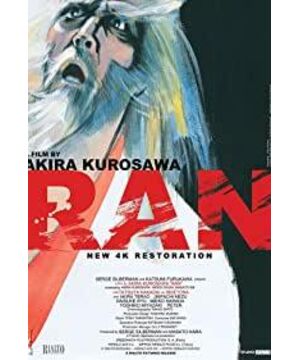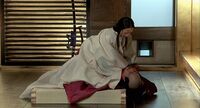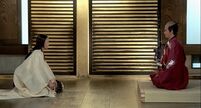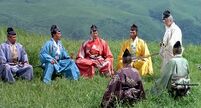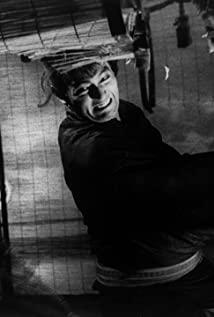I don't know much about Japanese history, and I don't know what period it was in Japan, but it seems a bit like the Spring and Autumn Period in China. It mainly tells about the wars of the three countries at that time, focusing on the internal melee in one of the countries after the old lord abdicated to the eldest son. The city is just made of stone, and there is nothing on the stone, but in order to conquer the city and conquer the land, human beings can kill each other to such an extent. The old master has been fighting all his life, creating and trying to protect his city. It was not until his son betrayed and his family broke down that he realized that the sky could be so beautiful. Even if all he wanted to do was to have a good talk with Saburo, it became a luxury that could never be realized. In addition to the old protagonist, there are several characters in the film that impressed me a lot. One is Mrs. Feng. At first, I thought she was just a bad daughter-in-law who put on airs and disrespected her father-in-law, until she made a deal with Jiro after she tried to assassinate him. That paragraph suddenly discovered the horror of this woman. I've been thinking about the scene where she pinched the moth. Why did the director arrange such a plot? Different people may have different interpretations. In my opinion, it may be a reflection of her destructive psychology. At first, she felt that she just didn't want to have other living things around Jiro, including Madam Su, but later found that her world was full of dead ashes, serving her husband and father-in-law with the hatred of destroying the family, and everything she did was for one purpose. Destroy this city created by her father, perhaps so that she can be assured that she will never be driven out, and she can rest assured. Blood splashing in this city may not be the ending she hates. However, such a woman who looked terrible at first, I couldn't help but hate her, but felt extremely pitiful for her. None of this was her fault. It was such a troubled world that caused such a tragic life. Similar to her fate is Madame Mo. But Madam Mo does not seem to be as fierce as Madam Feng. She pinned her hopes on Buddha and tried to forget her hatred, but Buddha failed to bless her in the end, and she did not escape the fate of being killed in the end. She left the Buddha to her younger brother, but the younger brother could only be alone in the end. And the girl next to the old master, forgot what her profession was called, she specially made the old master laugh. Facing a crazy old man, she also thought about leaving it alone, but she came back, maybe she has been used to it since she was a child Taking care of this old man, he doesn't know where he is going or what he will do when he leaves. It seems that the fate of freedom has no choice. Such an era is somewhat similar to China's Spring and Autumn Period and the Warring States Period and the Three Kingdoms period, which also saw constant wars. Speaking of the Spring and Autumn Period and the Warring States Period, we may remember more about some kings who reused talents, and how these talents aided the king through their own wisdom and strategies. About Lin Xiangru's friendship with Lianpo, about Shang Yang's reforms, about Tianji's horse racing, about oranges growing in Huainan, then oranges growing in Huaibei, about citrus trees, about three visits to thatched cottages, about borrowing arrows on grass boats... We seem to relish these stories, for their sake Wisely praised. But in fact, this may not be the main theme of that era. We may ignore the war, killing, and bloodshed in that era as shown in this movie... This is the main theme of that era. Maybe historians have narrowed these down, or We ourselves have deliberately ignored these in our historical sources. The director opened up the history to show us the bloody wound, which made people unbearable to look directly at it.
View more about
Ran reviews


